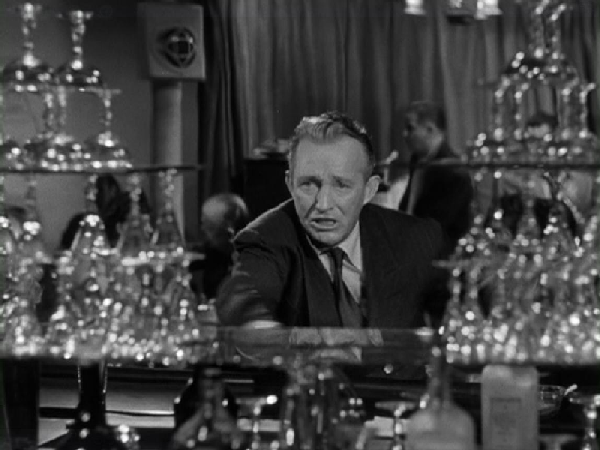
For, with all the uncompromising candor of George Seaton's adaptation of the play and with all the intense, perceptive acting of Grace Kelly and William Holden in the other roles, it is truly Mr. Crosby's appearance and performance as the has-been thespian who fights and is helped back to stardom that hits the audience right between the eyes.
Mr. Odets' drama is a searching and pitiless thing. It cuts to the hearts of three people without mercy or concern for their deep shame. It eviscerates a middle-aged actor who has taken to self pity and drink becaue of some canker in his confidence, which is, indeed, an occupational disease. And it lays bare the proud and bleak devotion of his sadly humiliated wife and the arrogance of the stage director who fails to grasp the shabby lie the actor lives.
Although the heroic character is inevitably the wife, who fights for her weak and sodden husband with the last store of energy in her weary frame, it is he -- the degraded husband -- who is the focus of attention here. And the force and credibility of the drama depends upon how he is played. That is why it is Mr. Crosby who merits particular praise, for he not only has essayed the character but also performs it with unsuspected power.
It is notable that his shabby actor is not so testy nor prone to smear his wife as was the cunning and cantankerous fellow Paul Kelly created on the Broadway stage. Mr. Crosby's fidgety defeatist is more the apologetic sort whose manner appeals for forgiveness and who only rarely explodes in rage. But he is none the less basically brutal as he torments his loyal "country girl" with his agonizing self-pity and his shamefully losing battles with his nerves.
Mr. Seaton, who wrote the screen play and directed with a hand as firm as iron, has allowed him one dispensation to yank on the strings of the heart. He has made him a musical comedy actor, which is logical with Mr. Crosby in the role, and has given him several numbers by Harold Arlen and Ira Gershwin to sing.
One is an item called "The Pitchman" which is supposed to be from one of the actor's old shows and which he sings when he does an audition, through the good offices of the stage director, early in the film. But the more sentimental obtrusion is a ballad, "The Search is Through," which is wrapped up with misty recollections of happier days and a little son who was killed. Naturally, Mr. Crosby tugs when the strings are in his hands.
But, for the most part, he plays the broken actor frankly and honestly, goes down to the depths of degratdation without a bat of his bleary eyes and then brings the poor guy back to triumph in a chest-thumping musical show with a maximum of painful resolution and sheer credibility. There is no doubt that Mr. Crosby deserves all the kudos he will get.
So does the lovely Miss Kelly, who likewise will get her share of praise for the quality of strain and desperation she puts into the battered, patient wife. And Mr. Holden, too, merits approval for the stinging yet oddly tender way he plays the stage director -- the man who gives the actor his break. Anthony Ross as a heartless producer and Gene Reynolds as a backstage myrmidon add the flavor of hard-grained reality to this trenchant, intense and moving film.
The Country Girl comes along fitly as one of the fine and forceful pictures of the year.
Read what Bing had to say about his role in "Country Girl."